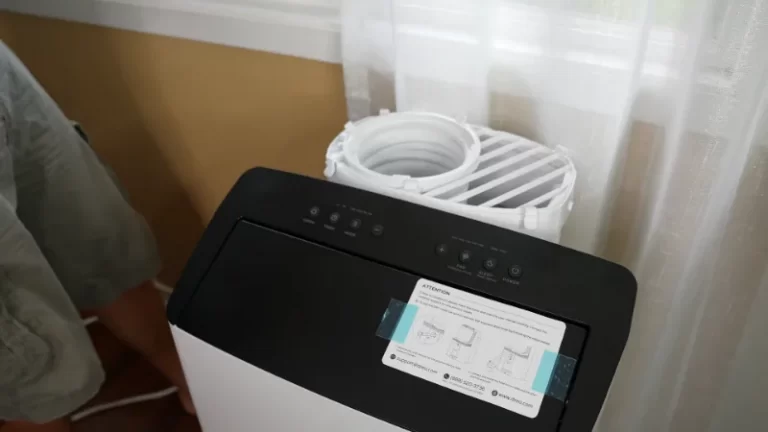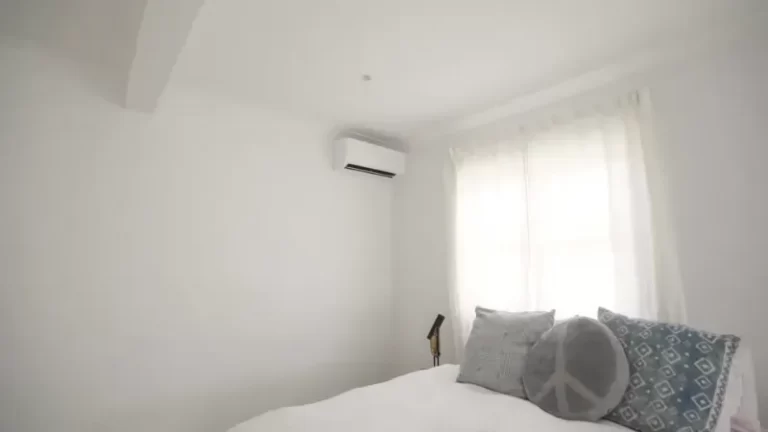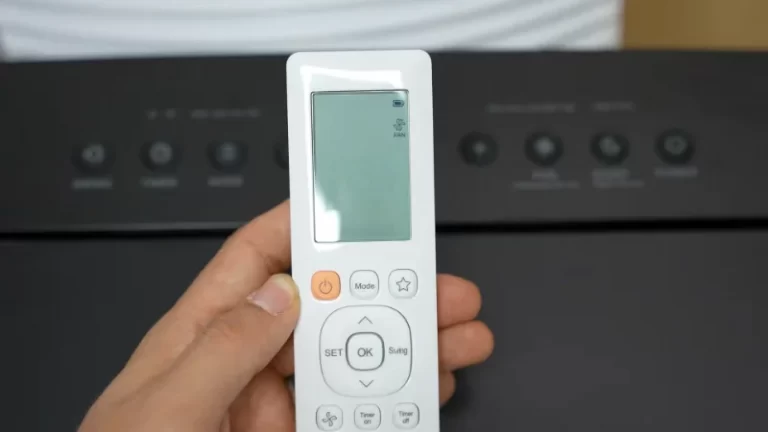Ice Maker Problems in French Door Refrigerators and Solutions
Ice makers in french door refrigerators have become a popular and convenient feature in modern kitchens. With the ability to dispense ice at the touch of a button, it’s no wonder that many homeowners have integrated this feature into their homes.
However, as with any complex appliance, there are often issues that can arise with the ice maker. Common problems include the ice maker not making enough ice, the ice maker freezing up, or the ice maker getting stuck.
Understanding the root causes of these issues can help homeowners diagnose and fix the problem in a timely manner, ensuring that their ice maker continues to provide a convenient and reliable source of ice.
You'll Learn About
Ice Maker Problems in French Door Refrigerators
Ice makers are a common and convenient feature in many french door refrigerators, but they can also cause problems if they aren’t functioning properly. Some of the most common issues include the ice maker failing to make any ice, not making enough, freezing up, or getting stuck.
These problems can often be tied back to components such as water valves and lines, the water filter, the ice maker control arm, compartment temperatures, and the ice bin. If your french door refrigerator’s ice maker is not working, some simple solutions include turning the ice maker off and then back on, setting the correct temperature, or resetting the device.
If these solutions do not work, it may be necessary to troubleshoot and repair specific components, such as the water filter or control arm.
Problem 1: Ice Maker Not Making Ice
One of the most common problems that homeowners encounter with their french door refrigerator’s ice maker is a failure to produce ice. This can be a frustrating issue, especially when you’re relying on your ice maker to provide ice for drinks or to keep food items cold. There are a number of possible causes for this issue, which we’ll explore in the following section.
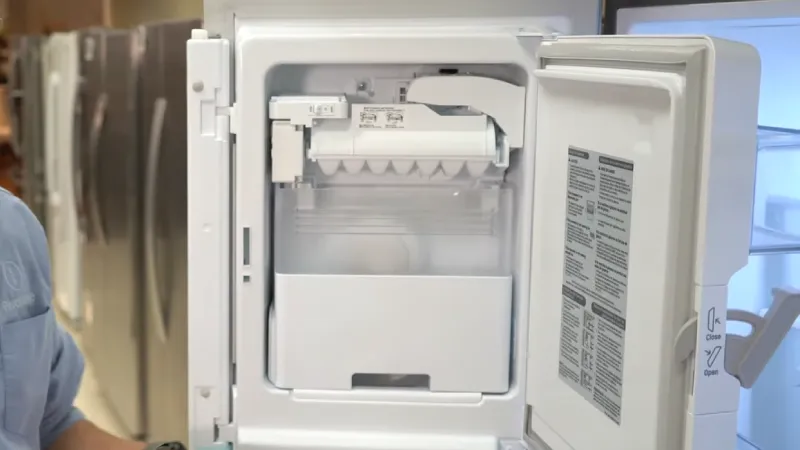
Possible Causes and Solutions
Low Water Pressure
The first thing to check if your ice maker is not making ice is the water pressure. If the water pressure is low, it could be preventing the ice maker from functioning properly. To check water pressure, locate the main water valve and turn it off and then on again to see if the water pressure has improved.
Clogged Water Line
Another possible cause for an ice maker not making ice is a clogged water line. Check the water line for any kinks or blockages and remove any debris or obstructions to restore water flow.
Dirty Water Filter
A dirty water filter can also cause the ice maker to stop working. If the water filter is dirty, replace it with a new one to improve water flow and restore the ice maker to working order.
Broken Water Inlet Valve
If the water inlet valve is broken, it can prevent water from flowing into the ice maker. To test the valve, unplug the refrigerator and use a multimeter to check for continuity. If the valve is found to be faulty, replace it to restore the ice maker to working order.
Thermostat Set Too High
Finally, the thermostat setting on your refrigerator may be set too high, preventing the ice maker from functioning properly. Set the thermostat to a lower setting to allow the ice maker to start producing ice again.
If your french door refrigerator’s ice maker is not making ice, there are a number of potential causes that can be easily fixed. Whether it’s a clogged water line, a dirty water filter, or a broken water inlet valve, there is likely a simple solution that can restore the ice maker to working order.
By taking the time to diagnose and fix the issue, you can ensure that your ice maker continues to provide a convenient and reliable source of ice for years to come.
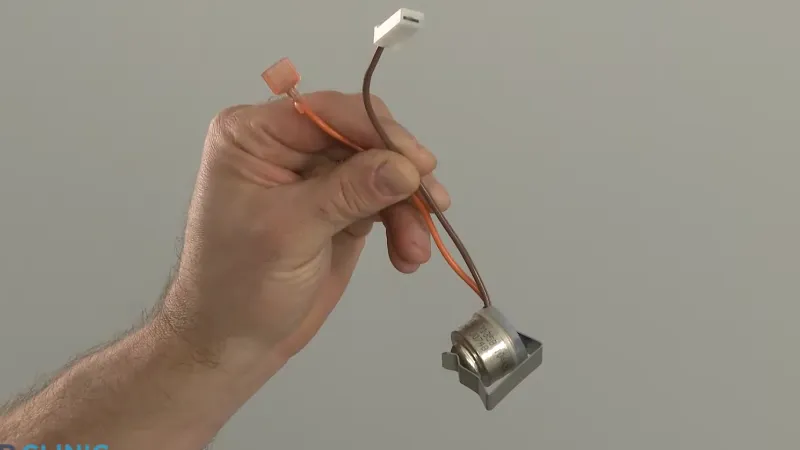
Problem 2: Ice Maker Not Making Enough Ice
Ice makers in french door refrigerators are a convenient way to have a steady supply of ice on hand, but what happens when the ice maker doesn’t make enough ice to keep up with demand? This can be a frustrating problem, but there are a few possible causes and solutions.
Possible Causes
- Clogged or frozen water line: The water line that supplies the ice maker can become clogged with mineral deposits or freeze, reducing the flow of water to the ice maker.
- Incorrect water pressure: If the water pressure is too low, it can reduce the amount of water that reaches the ice maker, leading to smaller ice cubes.
- Low refrigerant: If the refrigerant levels in your refrigerator are low, the freezer may not be cold enough to make enough ice.
Solutions
- Clean the water line: If you suspect a clogged water line, you can try cleaning it with a solution of equal parts water and vinegar.
- Check water pressure: You can check the water pressure at the refrigerator by turning off the water supply and then turning it back on to see if the water pressure is sufficient.
- Contact a professional: If you suspect a refrigerant problem, it’s best to contact a professional for a proper diagnosis and repair.
If your ice maker is not making enough ice, it’s important to address the issue promptly to avoid further problems. By understanding the possible causes and solutions, you can take steps to fix the issue and keep your ice maker functioning properly.
Problem 3: Ice Maker Freezing Up
An ice maker that freezes up can be a frustrating issue, especially when you’re counting on a steady supply of ice. There are a few possible causes and solutions to this problem.
Possible Causes
- Clogged or dirty air vents: Air vents play an important role in regulating the temperature in the ice maker, and if they become clogged or dirty, the ice maker may freeze up.
- Incorrect temperature setting: If the temperature in the freezer is set too low, it can cause the ice maker to freeze up.
- Damaged or faulty water valve: If the water valve that supplies water to the ice maker is damaged or faulty, it can cause the ice maker to freeze up.
Solutions
- Clean the air vents: You can clean the air vents with a soft cloth and a solution of equal parts water and vinegar.
- Adjust the temperature: You can try adjusting the temperature in the freezer to see if it resolves the issue.
- Replace the water valve: If the water valve is the issue, you’ll need to have it replaced by a professional.
If your ice maker is freezing up, it’s important to address the issue promptly to avoid further problems. By understanding the possible causes and solutions, you can take steps to fix the issue and keep your ice maker functioning properly.
Problem 4: Ice Maker Getting Stuck
Ice makers in French door refrigerators are an important and convenient feature, but when they become stuck, it can be a major inconvenience. If the ice maker gets stuck, it can prevent it from producing ice, which can be a problem when hosting guests or needing ice for drinks. Here are some possible causes and solutions for this issue:
The ice maker getting stuck can happen when ice begins to accumulate around the ejector arm. This can prevent it from moving, which in turn stops the ice maker from functioning properly. The ice may be stuck because the freezer temperature is too warm, the defrost system is not working, or there is an issue with the ice maker itself.
Possible Causes and Solutions
- The freezer temperature is too warm: If the freezer temperature is not set low enough, the ice will melt and cause the ice maker to become stuck. To fix this issue, adjust the temperature to a lower setting.
- The defrost system is not working: If the defrost system is not functioning properly, it can cause ice to accumulate and freeze the ice maker. To resolve this issue, clean the defrost drain and make sure it is not clogged. If the defrost system still does not work, it may need to be repaired or replaced.
- The ice maker itself is malfunctioning: In some cases, the ice maker may be the cause of the problem. It may need to be cleaned, repaired, or replaced.
It’s important to regularly check and clean your ice maker to avoid problems like this one. If you are unable to fix the issue yourself, it’s best to consult a professional for repairs.
Problem 5: Water Leaks
The issue of water leaks from the ice maker in a french door refrigerator can be a frustrating and potentially damaging problem. This can result in water damage to the floor and other parts of the kitchen, as well as affecting the overall performance and functionality of the ice maker.
Possible Causes
- Clogged Drain Line: The drain line in the ice maker can become clogged with impurities, causing water to leak from the unit.
- Broken Water Inlet Valve: A broken water inlet valve can cause water to leak from the unit, as the valve is responsible for controlling the flow of water into the ice maker.
- Loose Hoses: Loose hoses connecting the water supply to the ice maker can cause water to leak from the unit.
Solutions
Clean the Drain Line
Cleaning the drain line regularly can prevent clogs and reduce the risk of water leaks. This can be done by using a mixture of water and white vinegar to flush the line.
Replace the Water Inlet Valve
If the water inlet valve is broken, it will need to be replaced to prevent water leaks.
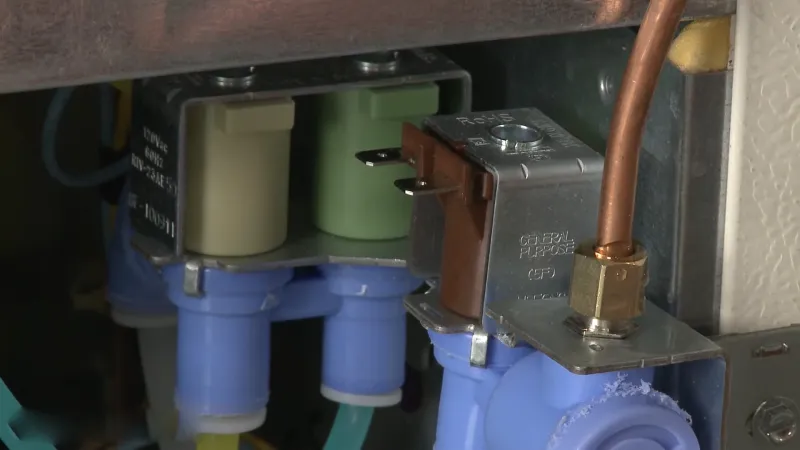
Tighten Loose Hoses
Loose hoses can be tightened by using pliers or a wrench. It’s important to tighten hoses securely to prevent water leaks.
By addressing the issue of water leaks, you can prevent damage to your kitchen and ensure that your french door refrigerator continues to operate properly and efficiently.
Problem 6: No Power to Ice Maker
The issue of the ice maker not receiving any power is a common one in french door refrigerators. This issue can cause the ice maker to not function at all or only partially. There are several possible causes and solutions for this problem.
The power supply to the ice maker can be interrupted for a variety of reasons, including tripped circuit breakers, blown fuses, unplugged refrigerators, or dead batteries in the control panel. This can prevent the ice maker from functioning properly or not at all.
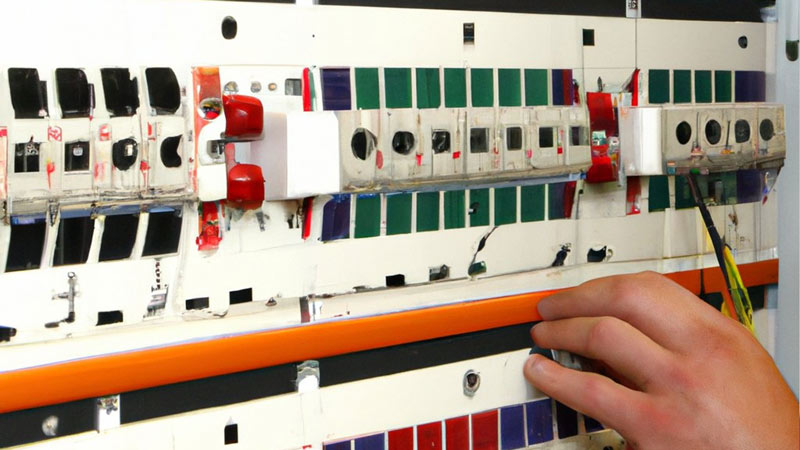
Possible causes and solutions: To resolve this issue, you can check for tripped circuit breakers and blown fuses, or make sure that the refrigerator is properly plugged in. If the problem persists, it may be due to a dead battery in the control panel. This can usually be resolved by replacing the battery with a new one.
If you are unable to resolve the issue, it may be best to consult with a professional technician to diagnose and repair the problem. A technician will be able to accurately diagnose the cause of the issue and recommend the most effective solution, whether it be a simple repair or a more complex replacement.
the issue of no power to the ice maker in french door refrigerators can be caused by a variety of factors. To resolve the issue, it is important to check for tripped circuit breakers and blown fuses, make sure the refrigerator is properly plugged in, or replace a dead battery in the control panel. If these solutions do not resolve the issue, it is recommended to consult with a professional technician for proper diagnosis and repair.
Problem 7: Ice Maker Control Arm Malfunction
The ice maker control arm is a lever located inside the freezer compartment that regulates the flow of water into the ice maker. When it malfunctions, the ice maker may not make ice or may make too much ice.
The ice maker control arm is a crucial component of the ice maker that ensures the proper functioning of the device. When it malfunctions, it can result in a variety of problems, including the ice maker not making any ice, making too much ice, or producing ice that is too thin or small.
Possible Causes and Solutions
There are several potential causes of ice maker control arm malfunction, including:
- Frost buildup in the freezer compartment, which can cause the arm to freeze in place.
- Dirty or clogged water lines, which can prevent water from reaching the ice maker.
- Wiring issues, which can prevent power from reaching the ice maker control arm.
- A faulty ice maker control arm, which may need to be replaced.
To Resolve the Issue, Try the Following
- Clean and defrost the freezer compartment to remove any frost buildup.
- Clean the water lines to remove any clogs.
- Check the wiring and ensure that power is reaching the ice maker control arm.
- If the problem persists, consider replacing the ice maker control arm with a new one.
It is important to regularly maintain and clean the ice maker and control arm to prevent issues and ensure optimal performance. In case of persistent problems, it is always recommended to consult a professional to avoid damaging the appliance or voiding the warranty.
Problem 8: Clogged Water Filter
The water filter in a french door refrigerator’s ice maker plays a crucial role in providing clean, safe ice. A clogged water filter can cause various problems, including the ice maker not making enough ice or not making ice at all. In some cases, a clogged filter can even cause water leaks.
Explanation of the issue: A clogged water filter can restrict the flow of water to the ice maker, causing it to produce less ice or not make ice at all. Over time, the filter can become clogged with debris, such as sediment or minerals, which can reduce its efficiency.
Possible causes and solutions: The main cause of a clogged water filter is using water that is contaminated or has a high mineral content. Replacing the water filter is the easiest solution to this problem.
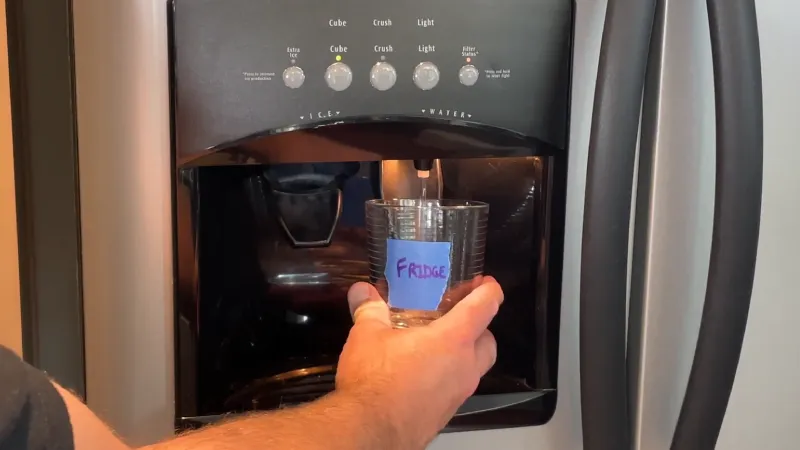
It is recommended to replace the water filter every 6 months or as often as recommended by the manufacturer. To replace the water filter, locate the filter in the back of the refrigerator, remove it, and replace it with a new one.
If you are unsure how to replace the water filter, refer to the owner’s manual or contact a professional for assistance.
a clogged water filter can be a serious issue for french door refrigerators with ice makers. Regularly checking and replacing the water filter can prevent problems from occurring and ensure that the ice maker is working efficiently.
Problem 9: Incorrect Temperature Settings
The temperature settings within your french door refrigerator play a crucial role in ensuring that the ice maker functions properly. If the temperature is set too high, the ice may not freeze or may melt before it can be dispensed. If the temperature is too low, the ice may freeze in the ice maker’s tray, making it difficult to remove.
Incorrect temperature settings within your french door refrigerator can cause several issues with the ice maker. When the temperature is set too high, the ice maker may not freeze the ice properly, or the ice may melt before it can be dispensed. If the temperature is too low, the ice may freeze in the ice maker’s tray, making it difficult to remove.
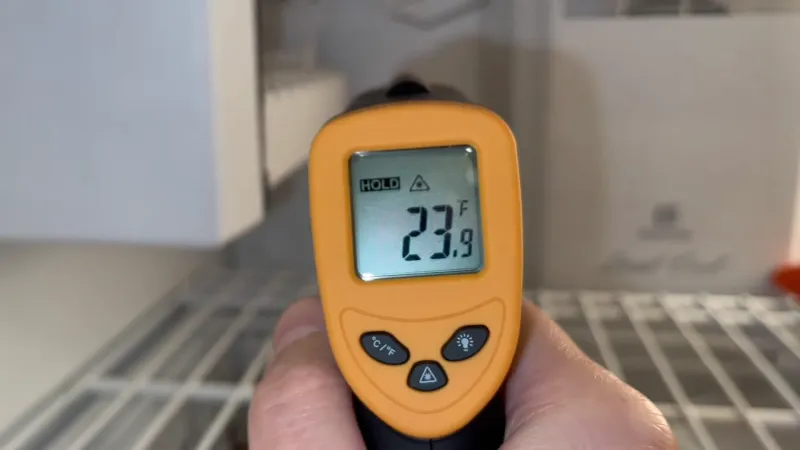
Possible Causes and Solutions
The most common cause of incorrect temperature settings is a faulty thermostat. If this is the case, the thermostat will need to be replaced. To check the temperature settings, refer to your refrigerator’s user manual or consult a professional.
Another possible cause of incorrect temperature settings is a clogged air vent. If the air vent is clogged, it can prevent cold air from circulating properly, leading to temperature fluctuations. To fix this issue, clean the air vent and ensure that it is free from obstructions.
In some cases, incorrect temperature settings may be due to a problem with the control board. If this is the case, the control board will need to be replaced.
If you are unsure of the cause of the incorrect temperature settings, it is recommended that you consult a professional for further assistance.
Problem 10: Defective Ice Maker
One of the most common issues that can arise with ice makers in french door refrigerators is a defective ice maker. This can result in a variety of problems, such as the ice maker not making ice, not making enough ice, or freezing up.
Possible Causes and Solutions
A defective ice maker can be caused by a number of factors, including a worn out motor, faulty electrical components, or a malfunctioning thermostat. In some cases, the issue may be due to a manufacturing defect.
If you suspect that your ice maker is defective, the first step is to unplug the refrigerator and check the connections and wiring to ensure that everything is securely connected. If the connections are good, you may need to replace the ice maker.
If the issue persists, it is best to contact a professional repair service to diagnose and repair the problem. In some cases, the issue may be covered under warranty, so it is important to check the manufacturer’s warranty before calling a repair service.
If you are not comfortable performing these repairs yourself, it is always best to seek the help of a professional. A qualified repair technician will be able to diagnose the issue and recommend the best course of action to get your ice maker working again.
GE Profile Refrigerator Ice Maker Problems French Door and Solutions
Conclusion
In conclusion, ice maker problems in French door refrigerators are common but can often be solved easily. Problems include no ice making, insufficient ice making, ice maker freezing, ice maker stuck, water leaks, no power, control arm malfunction ice maker, clogged water filter and incorrect temperature settings.
It is important to address these issues promptly to ensure proper device operation. By taking care of these issues quickly, you can enjoy the convenience of having an ice maker in your French door refrigerator for years to come.

